Maryland government contractor background checks involve a multi-layered screening process that combines federal requirements, agency-specific protocols, and unique considerations for major installations like Fort Meade NSA and Aberdeen Proving Ground. Contractors operating in Maryland's $50+ billion federal contracting ecosystem must navigate DCAA compliance standards, SEAD 5 investigative tiers, and installation-specific credentialing requirements that often exceed baseline federal mandates.
Key Takeaways
- Maryland hosts over 8,000 federal contractors supporting critical national security installations, requiring stringent background screening beyond standard commercial checks.
- Federal contractor background checks in Maryland follow SEAD 5 tiered investigation standards, ranging from Tier 1 (low-risk positions) to Tier 5 (top secret clearances).
- Fort Meade NSA contractors face additional counterintelligence-focused screening including polygraph examinations and continuous evaluation protocols.
- DCAA compliance auditors in Maryland scrutinize contractor timekeeping and accounting systems as part of the overall vetting process for government contracts.
- Background check timelines vary significantly, with basic Tier 1 investigations completing in 2-4 weeks while Tier 3 (secret clearance) averages 4-8 months in 2025.
- Maryland does not impose additional state-level background check requirements specifically for federal contractors beyond federal mandates.
- Criminal records don't automatically disqualify candidates—adjudicators evaluate the whole-person concept including rehabilitation efforts and time elapsed since offenses.
Understanding Maryland's Federal Contracting Landscape
Maryland ranks sixth nationally in federal contract spending, with agencies awarding over $52 billion to Maryland contractors in fiscal year 2024. The state's strategic concentration of defense, intelligence, and research installations creates unique background check requirements. These requirements blend federal investigative standards with installation-specific security protocols. Fort Meade, home to NSA, U.S. Cyber Command, and Defense Information Systems Agency, represents the largest employment center for cleared contractors on the East Coast.
The Maryland federal contractor workforce exceeds 180,000 personnel. These workers support missions across cybersecurity, biomedical research, aerospace engineering, and defense contracting. Aberdeen Proving Ground employs approximately 30,000 military, civilian, and contractor personnel. Meanwhile, NASA's Goddard Space Flight Center in Greenbelt adds another 10,000+ positions requiring various security clearance levels. This concentration means Maryland contractors encounter more rigorous and specialized screening procedures than contractors in states with fewer sensitive government installations.
Understanding Maryland government contractor background checks requires distinguishing between position-based investigation tiers, agency-specific requirements, and installation credentialing processes. The federal government eliminated the outdated "NAC" and "NACI" terminology in 2016. It replaced these with the tiered investigation system under SEAD 4, which was updated to SEAD 5 in 2023. Maryland contractors must navigate this modernized framework while accounting for local processing timelines through the Maryland FBI field office and Defense Counterintelligence and Security Agency regional offices.
Federal Background Check Tiers for Maryland Contractors

The federal government uses a five-tier investigation system for Maryland security clearance background checks. Each tier corresponds to specific position sensitivity levels and access requirements. Lower tiers support non-sensitive positions, while higher tiers enable access to classified information. Consequently, Maryland contractors must understand which tier applies to their position before beginning the clearance process. This knowledge helps set realistic timeline expectations and preparation requirements.
Tier 1 and Tier 2 Investigations
Tier 1 investigations represent the baseline screening for low-risk, non-sensitive positions within federal contracting, including national agency checks covering FBI criminal history, credit checks, and employment verification for the past three years. Maryland contractors in administrative support, facilities maintenance, or non-IT positions typically undergo Tier 1 screening with processing times averaging 2-4 weeks. Tier 2 investigations expand the scope significantly to support moderate-risk public trust positions and provide foundational screening for contractors accessing federal facilities without classified information.
The Tier 2 investigation process includes several enhanced verification components beyond the basic Tier 1 screening:
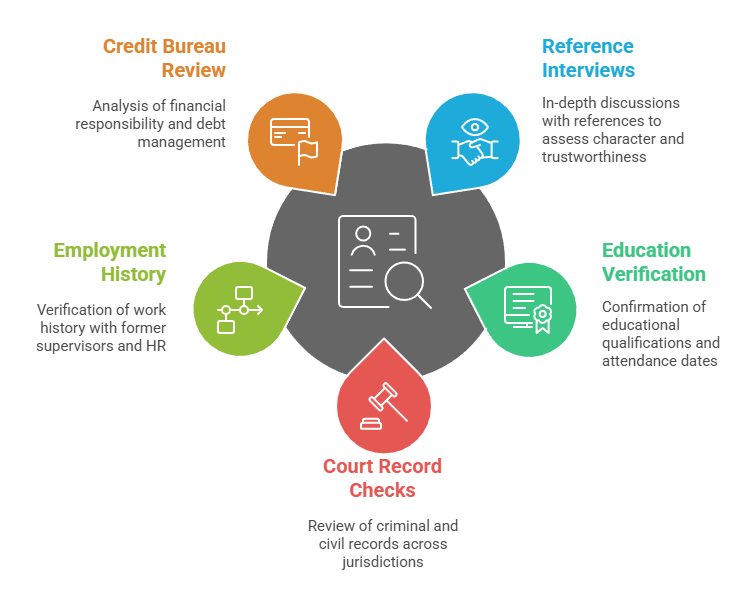
- Reference interviews: In-depth discussions with personal and professional references about character and trustworthiness
- Education verification: Confirmation of degrees, certifications, and attendance dates from educational institutions
- Court record checks: Review of criminal and civil records in all jurisdictions where the candidate has lived
- Extended employment history: Verification of work history with direct contact to former supervisors and HR departments
- Credit bureau review: Comprehensive analysis of financial responsibility and debt management patterns
Maryland DCAA compliance auditors typically hold Tier 2 investigations given their access to sensitive contractor financial data. Processing times for Tier 2 range from 6-12 weeks depending on the complexity of the candidate's background and responsiveness of references.
Tier 3 Through Tier 5 Security Clearances
Tier 3 investigations grant Secret clearance for Maryland contractors accessing classified information at installations like Fort Meade and Aberdeen Proving Ground. The investigation encompasses a review covering 10 years of residence, employment, and education history. Additionally, it includes interviews with neighbors, coworkers, and personal references. Secret clearance processing in Maryland currently averages 4-8 months. This represents significant improvement from the 12+ month timelines seen in 2018-2020.
| Investigation Tier | Clearance Level | Typical Processing Time | Key Requirements |
| Tier 3 | Secret | 4-8 months | 10-year background review, field interviews |
| Tier 5 | Top Secret | 8-16 months | 15-year background review, enhanced coverage |
| Tier 5R | Top Secret/SCI | 10-18 months | Counterintelligence polygraph, lifestyle examination |
Tier 5 investigations support Top Secret clearances essential for Maryland contractors at NSA, Cyber Command, and classified programs at Aberdeen Proving Ground. These investigations review 15 years of background history with enhanced scrutiny of foreign contacts, financial records, and personal conduct.
Continuous Vetting and Insider Threat Programs
The federal government implemented continuous vetting in 2020, fundamentally changing how Maryland government contractor background checks function after initial clearance grants. Rather than periodic reinvestigations every 5-10 years, cleared contractors now undergo automated monitoring of criminal databases, financial records, and government systems access patterns. Fort Meade installations actively employ insider threat programs using behavioral analytics, anomaly detection in network activity, and peer reporting systems to identify potential security risks.
Maryland contractors with active clearances must understand that specific life events trigger focused reviews even between scheduled reinvestigations:
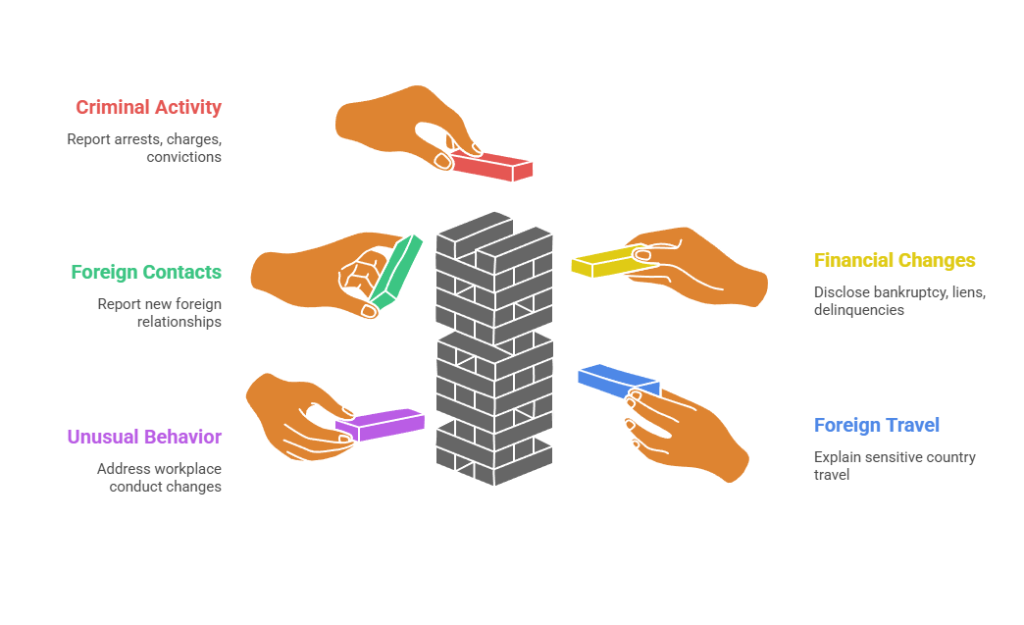
- Criminal activity: Arrests, charges, or convictions at federal, state, or local levels
- Financial changes: Bankruptcy filings, foreclosures, tax liens, or delinquencies exceeding 120 days
- Foreign contacts: New relationships with foreign nationals, especially from countries of concern
- Foreign travel: Trips to sensitive countries or unexpected travel patterns requiring explanation
- Unusual behavior: Workplace conduct changes, security violations, or concerning statements about government policies
Contractors must report these changes within timelines specified in their security briefings, typically 1-5 business days depending on the issue severity. This continuous evaluation approach aims to identify security concerns in near-real-time rather than discovering issues years after they develop.
DCAA Compliance Requirements in Maryland
Defense Contract Audit Agency oversight represents a critical component of Maryland government contractor background checks for firms holding cost-reimbursable or time-and-materials contracts. DCAA auditors in Maryland primarily operate from the Baltimore branch office. They conduct pre-award accounting system audits and ongoing compliance reviews. These reviews examine timekeeping accuracy, cost allocation methodologies, and personnel billing practices. Contractors must demonstrate that personnel charging government contracts possess proper security clearances and position authorizations.
Maryland DCAA compliance extends beyond financial systems to encompass personnel security verification. Auditors review SF-86 submissions, clearance verification letters from the Defense Counterintelligence and Security Agency, and contract labor categories. This ensures contractors aren't billing cleared rates for uncleared personnel. The DCAA also examines orientation and training records. They verify that contractor employees completed required security briefings before accessing classified information or secure facilities.
Successful DCAA compliance requires Maryland contractors to maintain comprehensive documentation systems. First, timekeeping systems must capture daily time recording with specific contract charges and supervisor approval workflows. Second, personnel security files must contain clearance verification documents, training certificates, and SF-86 submission confirmations. Third, labor cost tracking must show direct correlation between employee clearance levels, position descriptions, and billing rates. Finally, records retention requires seven-year maintenance of background check documentation, clearance grants, and personnel security files. Maryland contractors near Fort Meade and Aberdeen Proving Ground face higher audit probability given the concentration of defense contracts in these regions.
Fort Meade Contractor Screening Protocols
Fort Meade contractor background check requirements exceed standard federal protocols due to NSA's signals intelligence mission and concentration of Special Access Programs. Contractors supporting NSA typically require Top Secret/SCI clearances. Moreover, they need counterintelligence-scope polygraph examinations covering unauthorized disclosure of classified information, sabotage, espionage, and terrorism. The polygraph process involves pre-test interviews, physiological monitoring during questioning, and post-test review sessions. These sessions typically last 3-4 hours.
NSA-Specific Background Check Requirements
NSA contractor screening emphasizes foreign influence concerns given the intelligence mission, requiring investigators to scrutinize all foreign contacts including family members, business associates, and casual acquaintances from international travel. Contractors with foreign-born spouses face enhanced review but aren't automatically disqualified from clearance eligibility. Maryland's diverse population near Fort Meade means many contractors successfully navigate these foreign influence considerations through comprehensive disclosure and mitigation strategies.
Key elements evaluated during NSA-specific background checks include:
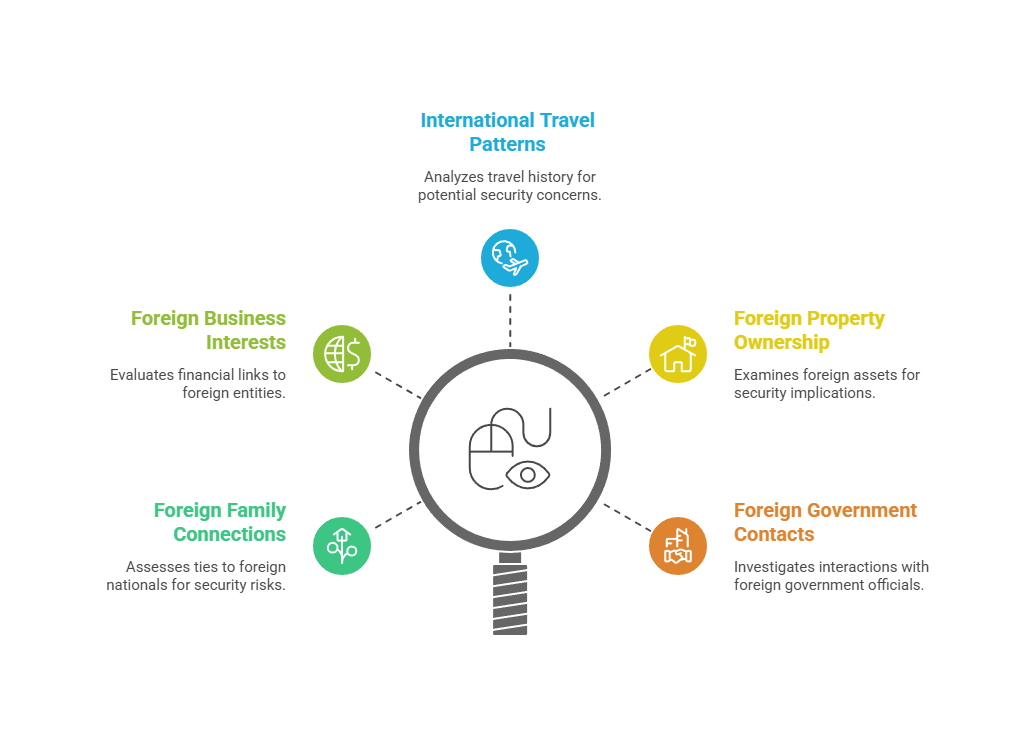
- Foreign family connections: Relationships with foreign nationals, including in-laws and extended family members
- Foreign business interests: Ownership stakes, consulting arrangements, or employment with foreign companies
- International travel patterns: Frequency, destinations, and purposes of trips to foreign countries
- Foreign property ownership: Real estate, bank accounts, or investments held in foreign nations
- Foreign government contacts: Any interactions with foreign officials, intelligence services, or military personnel
Adjudicators evaluate the relationship timeline, the spouse's immigration status, and potential for foreign intelligence exploitation when assessing these factors. The adjudication process values transparency and thorough disclosure, allowing contractors to explain circumstances and demonstrate that foreign connections don't create security vulnerabilities.
Installation Access and Credentialing
Beyond security clearances, Fort Meade contractors must obtain installation access credentials through the Defense Biometric Identification System. This process requires sponsorship from a government employee, validation of clearance eligibility, and biometric enrollment. The enrollment includes fingerprints and iris scans. Maryland contractors should complete this credentialing before their start date. The process typically requires 5-10 business days for initial access badge issuance.
Fort Meade employs a tiered installation access system. Contractors working in Sensitive Compartmented Information Facilities require additional SCIF-specific training and authentication. Furthermore, contractors accessing NSA's internal networks undergo cybersecurity awareness training and acknowledge monitoring policies. Vehicle registration and parking permits add another layer of administrative requirements for Maryland contractors commuting to Fort Meade.
Aberdeen Proving Ground and NASA Goddard Requirements
Aberdeen Proving Ground contractor screening focuses on chemical, biological, and munitions safety given the installation's research and testing mission. Contractors require Secret or Top Secret clearances depending on project classification. Additionally, those accessing chemical or biological agents need Personnel Reliability Program screening. Maryland contractors at Aberdeen undergo occupational health evaluations, safety training certifications, and specialized background reviews examining judgment and reliability indicators.
NASA Goddard Space Flight Center in Greenbelt presents different screening requirements centered on IT security and research integrity. Many Goddard contractor positions require Public Trust investigations rather than security clearances. However, classified programs supporting national security space missions demand Secret or Top Secret clearances. Maryland contractors at Goddard must complete NASA-specific IT security training. They must also badge through the Goddard Security Office and maintain clean cyber hygiene given the sensitive nature of space systems and research data.
| Installation | Primary Clearance Level | Unique Requirements | Processing Addition |
| Fort Meade (NSA) | Top Secret/SCI | Counterintelligence polygraph | +2-4 months |
| Aberdeen Proving Ground | Secret/Top Secret | Personnel Reliability Program | +3-6 weeks |
| NASA Goddard | Public Trust/Secret | IT security certification | +2-3 weeks |
Both installations require Maryland contractors to update emergency contact information and complete annual security refresher training. Additionally, contractors must report foreign travel before departure. Aberdeen Proving Ground contractors working with hazardous materials undergo additional criminal background checks. These focus on substance abuse history and mental health considerations relevant to safety-sensitive positions.
Background Check Timelines and Process Expectations
Maryland government contractor background checks follow investigative timelines influenced by tier complexity, candidate background characteristics, and current processing volumes. The Defense Counterintelligence and Security Agency has improved clearance processing speeds significantly since 2020. It implemented trusted workforce reforms that streamlined investigations. Maryland contractors benefit from proximity to federal investigative resources. However, the high volume of clearance applications from the Baltimore-Washington corridor can create localized processing delays.
Tier 1 investigations for non-sensitive positions typically complete within 2-4 weeks from SF-85 submission. Maryland contractors can track investigation status through the Electronic Questionnaires for Investigations Processing system. They receive automated updates when investigators complete major milestones. Delays most commonly arise from incomplete address history, unreachable references, or complex employment situations requiring additional verification.
Secret clearance timelines for Maryland contractors average 4-8 months in 2025. This marks substantial improvement from the 12-month averages seen during the 2018-2020 backlog period. The investigation begins when contractors submit the SF-86 through their security officer. It continues with automated record checks, field interviews with references and associates, and credit bureau reviews. Maryland FBI field office processing times for fingerprint-based criminal history checks average 48-72 hours. Nevertheless, out-of-state record requests can add weeks to the overall timeline.
Top Secret clearances require 8-16 months on average. Maryland contractors at Fort Meade and Aberdeen Proving Ground often experience the longer end of this range due to SCI and polygraph requirements. The investigation follows a structured process. First, automated records checks covering FBI criminal history, credit reports, and court records take 1-2 weeks. Second, subject interviews occur through in-person discussion of SF-86 contents with investigators, scheduled within 4-8 weeks. Third, field interviews with references, neighbors, employers, and educators consume 6-12 weeks. Fourth, adjudication involves security clearance decisions by authorized adjudicators, requiring 4-12 weeks. Finally, polygraph examinations, when required, add 2-4 months to the timeline. Maryland contractors can expedite processing by ensuring SF-86 accuracy and providing complete contact information for references.
Disqualifying Factors and Whole-Person Adjudication
Criminal records don't automatically disqualify Maryland contractors from government background checks. However, specific offenses raise significant concerns. Adjudicators evaluate criminal history under the whole-person concept. They examine offense severity, time elapsed, rehabilitation evidence, and conduct patterns. Maryland contractors with single misdemeanors occurring 5+ years ago typically receive favorable adjudications if they demonstrate responsible conduct since the incident.
Criminal History Considerations
Serious disqualifying factors include recent felony convictions, sexual offenses, crimes involving national security, and patterns of criminal behavior indicating poor judgment. Maryland contractors convicted of espionage, terrorism-related offenses, or unauthorized disclosure of classified information face permanent disqualification from clearance eligibility. Drug trafficking convictions within the past seven years create presumptive disqualifications. However, Maryland's 2014 marijuana decriminalization means simple possession offenses receive more lenient evaluation than in previous decades.
Financial history represents another critical adjudication factor for Maryland government contractor background checks. Delinquent debts, bankruptcies, foreclosures, and tax liens indicate potential vulnerability to financial pressure or foreign exploitation. Adjudicators distinguish between financial problems caused by circumstances beyond the contractor's control and financial irresponsibility reflecting poor judgment. Maryland contractors can mitigate financial concerns by documenting payment plans, demonstrating consistent debt reduction, and explaining circumstances that led to financial difficulties.
Foreign Contacts and Influence
Maryland's diverse, international population means many contractors have foreign-born family members, overseas business interests, or frequent international travel, requiring thorough disclosure and evaluation during security clearance investigations. Foreign contacts don't automatically disqualify candidates, but adjudicators must assess whether these relationships create heightened risk of exploitation, coercion, or divided loyalty concerns. The adjudication process values honesty and transparency over perfect backgrounds, meaning contractors should fully disclose all foreign contacts rather than attempting to minimize or conceal them.
Critical factors evaluated in foreign influence assessments include:
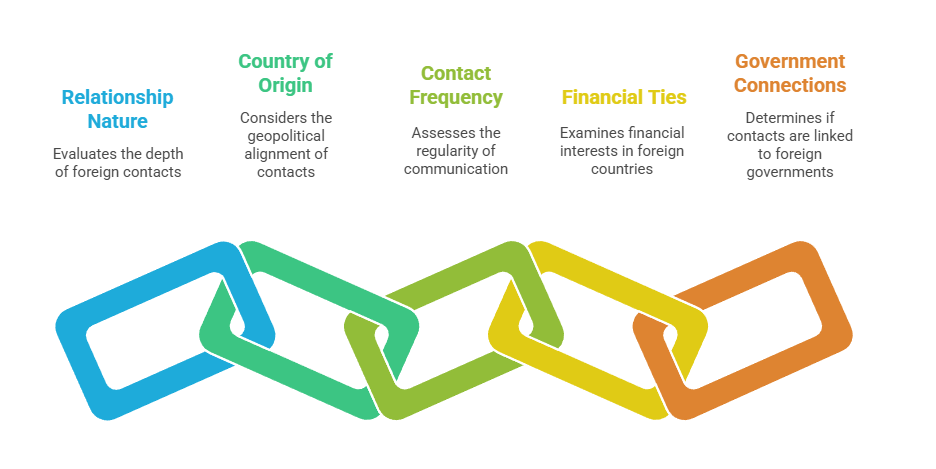
- Relationship nature: Whether foreign contacts are casual acquaintances or close personal relationships
- Country of origin: Contacts from adversarial nations face greater scrutiny than those from allied countries
- Contact frequency: Regular communication versus occasional interaction affects risk assessment
- Financial ties: Inheritance, property ownership, or business interests in foreign countries
- Government connections: Whether foreign contacts work for foreign governments, military, or intelligence services
Undisclosed foreign contacts create more serious concerns than the contacts themselves. Maryland contractors who fail to report foreign travel, omit foreign business relationships, or minimize foreign family connections on the SF-86 face potential denial for lack of candor, which is often more damaging than the underlying foreign contact issue.
Common Mistakes Maryland Contractors Make
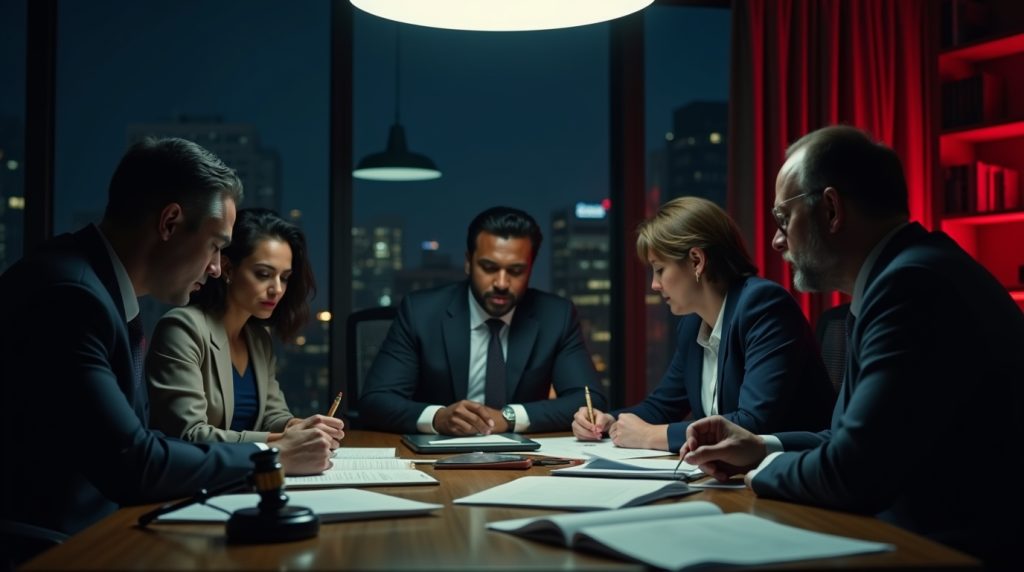
Maryland contractors frequently underestimate background check timelines. They accept contract positions without allowing adequate clearance processing time. Contractors requiring Secret clearances should begin the process 6-9 months before anticipated start dates. Top Secret/SCI positions demand 12-18 month lead times. Companies near Fort Meade and Aberdeen Proving Ground sometimes offer "contingent upon clearance" positions. However, contractors should maintain current employment until clearances finalize rather than assuming approval.
SF-86 completion errors represent the most common mistake delaying Maryland government contractor background checks. Contractors rush through the 136-page questionnaire. They provide incomplete addresses, omit short-term employment, or estimate dates rather than researching accurate information. Each error requires investigator follow-up, extending timelines by weeks or months. Maryland contractors should allocate 8-12 hours for thorough SF-86 completion. They need to gather documentation including 10-year residence history with exact addresses and start/end dates, employment records with company names and supervisor contacts, education verification with degrees and attendance dates, reference information with current phone numbers and email addresses, and foreign travel details with specific dates and destinations.
Another critical error involves inadequate preparation of references before investigators make contact. Maryland contractors should inform references that investigators will call. They should explain the investigation's nature and ensure references have accurate contact information on file. References who ignore investigator calls or provide vague information create delays requiring additional reference interviews. Additionally, failing to disclose adverse information represents the most serious mistake. Whether from embarrassment, fear of disqualification, or simple oversight, contractors who omit criminal history, drug use, or financial problems face denial for lack of candor. Security clearance adjudication prioritizes honesty above all else.
Costs and Financial Considerations
Government-sponsored security clearance investigations incur no direct cost to Maryland contractors. The federal government funds investigation expenses when contractors support classified programs or require clearances for government positions. The Defense Counterintelligence and Security Agency charges government agencies approximately $4,500 for Top Secret investigations and $2,000 for Secret clearances. However, these costs aren't passed to individual contractors.
Nevertheless, Maryland contractors often undergo employer-initiated pre-screening before companies sponsor them for government investigations. These commercial background checks cost $50-$500 depending on scope. They typically include criminal history checks in jurisdictions of residence, employment verification for recent positions, education credential verification, credit report review, and motor vehicle record checks. Maryland federal contractor screening for positions requiring professional licenses or specialized certifications may involve additional credential verification costs.
Maryland contractors changing employers while holding active clearances benefit from reciprocity policies that transfer clearances between contracts without new investigations. This reciprocity saves substantial time and cost. Contractors with current Secret or Top Secret clearances can typically begin new positions within 2-4 weeks for access verification rather than waiting months for new investigations. Maryland's concentrated federal contracting market makes clearance reciprocity particularly valuable. It enables contractors to move between Fort Meade, Aberdeen Proving Ground, and other installations efficiently.
Maryland-Specific Regulatory Considerations
Maryland state law does not impose additional background check requirements specifically for federal contractors beyond federal mandates. However, contractors should understand that Maryland's Fair Criminal Record Screening Standards Act restricts when employers can ask about criminal history during the hiring process. This "ban the box" legislation applies to private employers with 15 or more employees. It requires employers to wait until after the first interview to inquire about criminal convictions. Federal contractors remain subject to these state employment law protections even when pursuing security clearances.
Maryland contractors working on both federal and state contracts must distinguish between federal security clearance requirements and Maryland state contract background checks. State contracts may require Maryland Criminal Justice Information System checks, child abuse registry searches, or sex offender registry verification. These state-level checks differ from federal investigations and follow separate timelines. Contractors should clarify with their employers which background check types apply to their specific positions.
The Maryland Department of Labor maintains specific guidance for employers conducting background checks under state law. Employers must provide applicants with copies of background check reports and allow opportunities to dispute inaccurate information. Maryland's Consumer Protection Division enforces Fair Credit Reporting Act compliance for background screening companies operating in the state. Federal contractors should ensure their employers follow both federal and Maryland state requirements throughout the screening process.
Working with Security Officers and FSOs
Facility Security Officers (FSOs) serve as critical partners for Maryland contractors navigating the security clearance process, managing their organization's security program, submitting clearance applications, and serving as liaisons with government security officials. These designated personnel provide invaluable guidance throughout the investigation process. Maryland contractors should establish strong working relationships with their FSOs immediately upon hire to ensure smooth clearance processing and ongoing compliance with security requirements.
FSOs perform multiple essential functions that directly impact Maryland contractors' clearance success:
- Application submission: FSOs initiate and submit SF-86 forms through secure government systems on behalf of contractors
- Status tracking: They monitor clearance progress and can request updates from the Defense Counterintelligence and Security Agency
- Document management: FSOs maintain personnel security files, clearance verification letters, and training records
- Security training: They conduct initial and refresher briefings on security protocols and reporting requirements
- Incident coordination: FSOs manage security violation reports and coordinate with government security officials
- Facility inspections: They prepare for and host periodic security inspections of classified information systems
Contractors experiencing clearance delays or denials should work closely with their FSOs to understand available remedies. FSOs can help contractors prepare responses to interrogatories or letters of intent to deny, and in some cases coordinate with government contracting officers to extend employment offers pending clearance resolution. Maryland's concentration of experienced FSOs at Fort Meade and Aberdeen Proving Ground area firms provides contractors with valuable expertise navigating complex security situations.
Conclusion
Maryland government contractor background checks require navigating a complex framework of federal investigation tiers, DCAA compliance standards, and installation-specific protocols unique to Fort Meade, Aberdeen Proving Ground, and NASA Goddard. Success demands understanding the distinctions between Tier 1 through Tier 5 investigations and anticipating realistic processing timelines. Maryland contractors benefit from the state's strategic importance in federal contracting, with robust investigative infrastructure and proximity to decision-makers. The continuous vetting environment and whole-person adjudication approach means Maryland contractors should prioritize transparency, maintain clean financial records, and understand that most backgrounds can qualify through proper disclosure and mitigation.
Frequently Asked Questions
What disqualifies you from a government contractor background check in Maryland?
No single factor automatically disqualifies Maryland contractors, as adjudicators use whole-person evaluations considering offense severity, time elapsed, and rehabilitation efforts. However, recent felony convictions, espionage or terrorism offenses, patterns of criminal behavior, significant financial irresponsibility, undisclosed foreign contacts, and lack of candor during investigations create substantial disqualification risk. Maryland contractors with past issues should focus on demonstrating responsible conduct and complete honesty. The whole-person concept allows adjudicators to consider mitigating circumstances and rehabilitation evidence.
How long does a government background check take in Maryland?
Maryland government contractor background checks require 2-4 weeks for Tier 1 investigations, 6-12 weeks for Tier 2, 4-8 months for Secret clearances, and 8-16 months for Top Secret clearances as of 2025. Fort Meade positions requiring SCI access and counterintelligence polygraphs may extend to 18+ months. Timeline factors include investigation complexity, candidate background characteristics, reference responsiveness, and current processing volumes. Maryland contractors should plan accordingly and maintain current employment until clearances finalize.
Does Maryland require additional background checks for federal contractors beyond federal mandates?
Maryland does not impose state-level background check requirements specifically for federal contractors beyond federal investigation standards. However, individual installations like Fort Meade and Aberdeen Proving Ground add facility-specific credentialing, training, and access requirements that supplement federal clearances. Maryland contractors must comply with DCAA standards for defense contract compliance. Some Maryland state contracts for non-federal work may trigger separate state background check requirements under different regulatory frameworks.
What is the difference between Tier 1 and Tier 2 background checks for Maryland contractors?
Tier 1 investigations provide basic screening for low-risk positions, including FBI criminal history checks, employment verification, and credit checks covering three years. Tier 2 investigations support moderate-risk public trust positions with expanded scope including reference interviews, education verification, and court record checks in all jurisdictions of residence. Maryland contractors in administrative roles typically require Tier 1, while DCAA auditors and positions accessing sensitive but unclassified information require Tier 2. Processing times differ significantly, with Tier 1 completing in 2-4 weeks versus 6-12 weeks for Tier 2.
Can you work as a government contractor with a criminal record in Maryland?
Yes, Maryland contractors with criminal records can obtain security clearances and work on government contracts depending on offense type, severity, time elapsed, and rehabilitation evidence. Single misdemeanors from 5+ years ago rarely prevent clearance approval. Recent felonies, violent crimes, or patterns of criminal behavior create significant challenges. Adjudicators evaluate the whole person including post-offense conduct. Maryland contractors should emphasize rehabilitation efforts, stable employment, and responsible behavior when disclosing criminal history.
How much does a government contractor background check cost in Maryland?
Government-sponsored security clearance investigations cost Maryland contractors nothing—federal agencies fund investigation expenses when contractors require clearances for classified work. However, employers often conduct pre-screening background checks costing $50-$500 before sponsoring contractors for government investigations. Maryland companies establishing DCAA-compliant accounting systems may invest $2,000-$10,000 in setup costs. These represent business expenses rather than charges to individual contractors.
Do Fort Meade contractors need polygraph examinations for all positions?
Not all Fort Meade contractor positions require polygraphs—only those accessing Sensitive Compartmented Information or supporting specific NSA programs demand counterintelligence-scope polygraph examinations. Maryland contractors in administrative, facilities, or unclassified IT support roles at Fort Meade typically need Secret clearances without polygraphs. Top Secret/SCI positions supporting intelligence missions require polygraphs adding 2-4 months to clearance timelines. These examinations cover topics like unauthorized disclosure, foreign contacts, and security violations.
How does continuous vetting affect Maryland contractors with active clearances?
Continuous vetting subjects Maryland contractors with active clearances to automated monitoring of criminal databases, financial records, and foreign travel rather than only reviewing backgrounds during periodic reinvestigations. Contractors must report significant life changes including arrests, financial delinquencies exceeding 120 days, foreign contacts, and marriage to foreign nationals within 1-5 business days. Fort Meade and Aberdeen Proving Ground installations employ insider threat programs monitoring network activity and behavioral patterns. This makes ongoing security compliance essential throughout clearance validity periods.
Additional Resources
- Defense Counterintelligence and Security Agency - Security Clearance Process
https://www.dcsa.mil/is/security-clearance-process/ - National Archives - SEAD 5 Investigative Standards
https://www.archives.gov/isoo/security-config/sead-5.html - Defense Contract Audit Agency - Information for Contractors
https://www.dcaa.mil/Guidance/Contractors/ - Fort Meade Installation Access Requirements
https://home.army.mil/meade/index.php/about/Garrison/directorate-emergency-services/access-control - Security Executive Agent Directive 4 - National Security Adjudicative Guidelines
https://www.dni.gov/files/NCSC/documents/Regulations/SEAD-4-Adjudicative-Guidelines-U.pdf
Still have questions?
Get in touch with our team today for a personalized demo and discover how our tailored volume pricing and packages can drive results for your business!
How useful was this page?*
Note: your comments are anonymous. We use them to improve the website. Do not include any personal details.
Visit our FCRA Compliance Tool or leave a message here if you need a response.
From the blog Explore the GCheck Content Hub

Healthcare Background Check Requirements by State: A 2026 Operational Guide
14 Jan, 2026 • 18 min read
DUI Employment Restrictions by Industry: Complete 2026 Guide
14 Jan, 2026 • 19 min read
Financial Sector Background Checks: Navigating the 2026 Screening Landscape
13 Jan, 2026 • 18 min readThe information provided in this article is for general informational and educational purposes only and should not be construed as legal advice or a substitute for consultation with qualified legal counsel. While we strive to ensure accuracy, employment screening laws and regulations—including but not limited to the Fair Credit Reporting Act (FCRA), Equal Employment Opportunity Commission (EEOC) guidelines, state and local ban-the-box laws, industry-specific requirements, and other applicable federal, state, and local statutes—are subject to frequent changes, varying interpretations, and jurisdiction-specific applications that may affect their implementation in your organization. Employers and screening decision-makers are solely responsible for ensuring their background check policies, procedures, and practices comply with all applicable laws and regulations relevant to their specific industry, location, and circumstances. We strongly recommend consulting with qualified employment law attorneys and compliance professionals before making hiring, tenant screening, or other decisions based on background check information.

